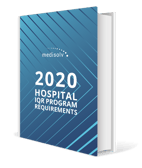FHIR for the Busy Quality Manager
By Scott Allen August 9, 2019 Industry Trends

FHIR is a new data format standard promising to expand the flow of healthcare data, improve healthcare outcomes, lower healthcare costs, and introduce a new era of world peace.
Well, OK. FHIR, which stands for Fast Healthcare Interoperability Resources and pronounced “fire”, doesn’t promise world peace. But, the eventual success of FHIR will lead to dramatic improvements in worldwide health data infrastructure. As FHIR adoption grows, we will see the flow of information between patients, providers, health organizations, and quality software, like Medisolv’s software, improve.
I see three reasons why FHIR is going to be a tremendous success.
1. FHIR is Modern
Our favorite standards organization, HL7 International, is the group responsible for bringing FHIR to life. HL7 is no stranger to defining data standards, and they are forging the FHIR standards using the experiences and lessons learned from 20 years of past work.
However, HL7 is not only looking at the past. They also see the industry adopting new styles of software architecture and moving in new directions with the use of healthcare data. For example, 20 years ago nobody envisioned a cellular phone with enough storage, bandwidth, and processing power to handle a complete medical record. Today’s phones not only handle a record with power to spare, they include sensors and Bluetooth connected devices that can augment a record with real-time data.
FHIR wants to make healthcare data available for smartphone apps targeting an individual, as well as machine learning algorithms analyzing a global population.
2. FHIR Builds on Proven Internet Standards
FHIR is building on top of proven Internet standards, like HTTP. HTTP is the hypertext transfer protocol – a protocol you are using at this moment with your web browser. We call HTTP a transport protocol because HTTP can move data from one computer to another, on everything from Medisolv’s server to the web browser running on your phone, tablet, PC or refrigerator.
The success of the world wide web is a testament to the flexibility and power of HTTP. There are already internet standards for encrypting HTTP to make the transport secure, and authentication standards for identifying users over HTTP. In other words, much of the infrastructure and plumbing for building FHIR connected services has been battle tested for decades and proven itself as scalable and secure.
3. FHIR Adoption Is Accelerating
Not only are EHR systems rolling out new FHIR capabilities with a regular cadence, but other prime movers in the technology industry are using FHIR, too. For example, Apple’s Health app for the iPhone can obtain and aggregate health records from multiple institutions. The app connects to institutions using standardized FHIR APIs. Google is working with HL7 to improve FHIR standards for machine learning, and is already building healthcare APIs in the Google cloud using FHIR standards. Microsoft, too, is not only building an open-source FHIR server, but is providing a managed platform for hosting FHIR services in their Azure cloud.
The Future with FHIR
As a person interested in improving healthcare outcomes, you should be excited about the possibilities for FHIR, and encourage your vendors and internal staff to use FHIR for data exchanges. The applications, services and plugins we can build on FHIR can transform the industry and allow health professionals to focus more on patient safety, quality and care.
 |
Scott is Medisolv's CTO. He has over 20 years of commercial software development experience across a wide range of technologies. He has successfully delivered software products across embedded, Windows, and web platforms for Fortune 50 companies and start ups. Scott was recently made a Microsoft Regional Director, one of only 175 worldwide. He is also a Microsoft MVP and a world recognized expert in .NET technologies. He is an author and co-author of several books, including Professional ASP.NET MVC 4, and is a speaker at international software development conferences. |
FREE DOWNLOAD:
2020 Hospital IQR Program Requirements eBook
Ensure a smooth and stress-free submission to the Hospital Inpatient Quality Reporting (IQR) program. Download the 2020 IQR Program Requirements eBook, which includes all you need to know to successfully complete the program in 2020.
 |
This guide includes:
|






Add a comment